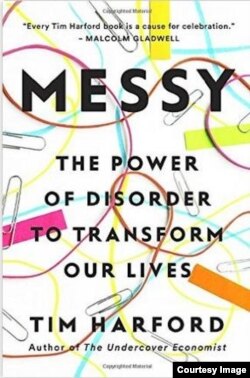Getting more organized is one of the most popular New Year’s resolutions among Americans. But as we start 2017, writer and economics journalist Tim Harford doesn’t think always being tidy is such a good habit. He argues that we really don’t have to organize our desks and computer files, or be absolutely precise in planning and preparing for work and life events. His new book - Messy: The Power of Disorder to Transform Our Lives - tells how disorder and uncertainty can lead to free thinking, creativity and success.
The magical imperfect tunes
Harford opens the book with a story about American jazz pianist Keith Jarret. As he began a concert at the Cologne Opera House in Germany in January, 1975, he discovered there was a problem with the piano.
“It was out of tune. The piano was basically unplayable,” Harford said. “But he felt he had to play this concert, a huge concert, by the way. There were 1,400 people in the audience. So he sat down, but before he started to play, he said, ‘I’m ready to record this concert because I want a documentary evidence of what a disaster sounds like, what happens when you don’t have the right instrument.' But when he did start to play, it was just beautiful, absolutely beautiful. Something really magical happened when Keith Jarrett tried to overcome the problems in that piano.”
Harford says there is a reason he began with that story.
“I wanted people to think about the situations where they face a very difficult starting point, obstacles, disruptions, things that aren’t working or having a plan - and yet somehow as they adjust and adapt to those obstacles. They find something much better than the original plan. They find some magic in the mess.”
Tidy vs. Messy
Messiness, he explains, is the opposite of tidiness.
“What I mean by tidiness is this habit of making sure that everything has some kind of label or category; everything is prepared; everything can be controlled," he explained. "Sometimes that will serve us very well, but often it’s actually not helpful in a complex, and ambiguous world. The messiness, I think, is this embrace of vagueness and improvisation and ambiguity and disorder. That doesn't always work. But I think it works more often that we tend to think.”
In fact, he insists, improvisation can spark creativity, pointing to civil-rights leader Martin Luther King, Jr., as an example.
“As a young man, he would prepare his speeches very carefully. He would prepare his sermons - maybe 15 hours' worth of preparation for a 20-minute speech. But it was only later, when he was under pressure and had no time. Suddenly he found himself giving talks in public, [before] TV cameras ... [and] much, much bigger audiences than he ever faced before, and yet he didn’t have these 15 hours to prepare his talk.”
Harford says King would write down a couple of notes and go to the church to give the speech and "it was brilliant, it was so powerful. People who knew him as a speaker were astonished at how much power he had acquired in his speaking and that came because he stepped away from the preparation and began to improvise and say what he really thought,” he said. “The 'I Have a Dream' speech, the most famous speech in America’s 20th century, half of that speech was improvised. And I can tell you, it’s the half that everybody remembers.”
Forgive your messiness
Harford says people tend to find clutter and irregularity disturbing, but don’t notice when it benefits them. He says we need to recognize when it’s important to be tidy and where it’s okay to be messy.
“Messiness can be a problem in some circumstances,” he admitted. “There are lots of situations where you want a very orderly plan. For example, when you’re dealing with financial systems, it’s a good idea to be very organized. It helps to be tidy in the kitchen for sure. You want to know where the tools you use in the kitchen are. If you’re working on a production line, with machinery, of course everything needs to be very well organized, very tidy and not to leave things lined around because that’s dangerous.”
But the office is a different environment. And Harford notes that his desk is usually very messy.
“And when I’m doing research for a book, it is chaos. It should be chaos. I need to forgive myself for the randomness and the disorder because it’s not causing any problems. It’s actually helping me be a better writer.”
Harford says chaotic desks are messy because we’re dealing with a messy flow of information.
“What most studies find is that very often the messier approach actually works better because documents are ambiguous; it’s not clear where you should file them,” he says. “So if it’s not clear where you should file them, maybe it’s better to keep them where you can see them until more info comes out. People who file their documents too quickly find that they cannot actually find them again. So it’s not like looking for your keys or looking for your glasses or coffee mug. Looking for your emails is really a different problem, and a messy approach can often be more efficient.”
Harford says what he would like readers to take away from his book is the idea that resolving to be at least a bit messy can be a good start to the new year.

